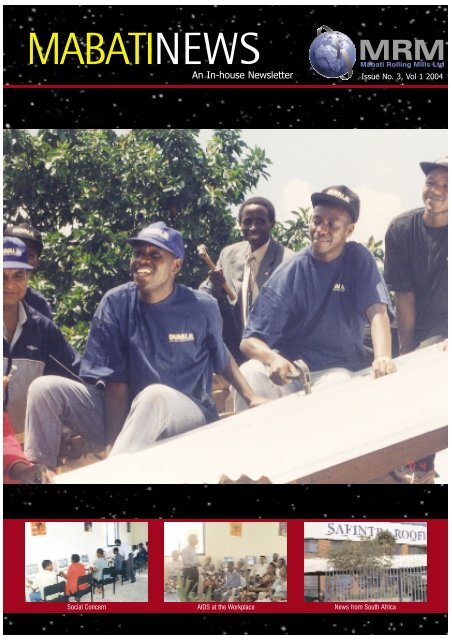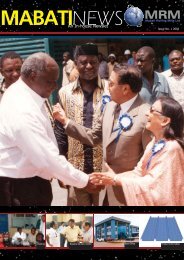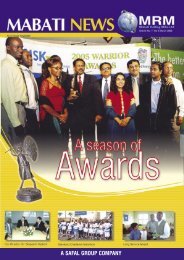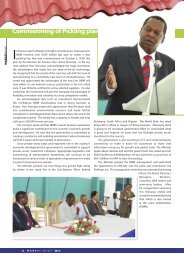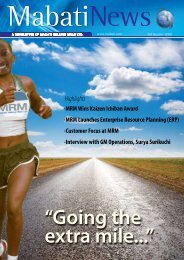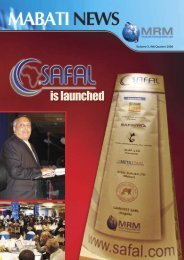mrmnewsletterno32004.. - Mabati Rolling Mills
mrmnewsletterno32004.. - Mabati Rolling Mills
mrmnewsletterno32004.. - Mabati Rolling Mills
You also want an ePaper? Increase the reach of your titles
YUMPU automatically turns print PDFs into web optimized ePapers that Google loves.
MABATINEWS<br />
An In-house Newsletter Issue No. 3, Vol 1 2004<br />
Social Concern<br />
AIDS at the Workplace<br />
News from South Africa
FROM THE EDITOR<br />
Editorial<br />
Our newsletter is out again to give you more news and<br />
views from MRM. We continue to tap into the well of<br />
knowledge through seminars, workshops and shake-ups<br />
to raise the bar in all aspects of our operations, hence enabling<br />
us to retain market leadership though quality products and<br />
service delivery. With the current upheaval in prices and the<br />
seemingly uncertain economic future, it is necessary that we<br />
continually go back to the drawing board. Read more information<br />
on this inside.<br />
Corporate Social Responsibility continues to rank high at<br />
MRM. Among the programmes are HIV/Aids sensitization<br />
workshops, which continue to run in Mariakani and will soon be<br />
introduced in Nairobi. Alleviation of poverty housing programmes<br />
are being tackled more aggressively through the partnership with<br />
Habitat for Humanity, while access to computer literacy is now a<br />
reality for the students in Mariakani and Kitui.<br />
We highlight the harrowing experiences of some of our own<br />
staff members with carjackers as we look at increased insecurity<br />
in Kenya.<br />
Surprisingly, despite the invitation, we did not receive any<br />
correspondence from our dealers. However, the offer is still open.<br />
We welcome your opinion.<br />
Finally, we give you the first glimpse into a series of articles<br />
featuring our SAFAL group of companies which is a part of the<br />
Comcraft group of companies. Starting with South Africa, this<br />
series will allow you to conceptualise the global nature of the<br />
SAFAL group, of which you are a part.<br />
Good reading.<br />
George Mathew<br />
Contents<br />
2 z Word from the Editor<br />
z Creating Synergy with Professionals<br />
3 z Word from the CEO<br />
z Mr. Kaushik Apppointed to Standard Chartered<br />
Board<br />
4 z Marketing team takes on a new face<br />
z Export Sales<br />
5 Gemba Awards: Teams Awarded<br />
6 Social Concern<br />
z Building in Kisii<br />
z Dumu ZAS comes to the rescue in Gatundu<br />
z MRM-EIB Technical Institute officially<br />
opened<br />
z Computers for Rural Kitui<br />
8 z Why a Workplace Programme on HIV/Aids<br />
is necessary today<br />
10 Insecurity: Carjackings on the Rise<br />
11 z Training<br />
12 z News from South Africa<br />
CREATING SYNERGY WITH PROFESSIONALS<br />
At the MRM stand: Hon. Raila Odinga confers with MRM Chairman, Dr.<br />
Manu Chandaria as the MRM CEO, Mr. Kaushik Shah, Mr. Ashok Sood<br />
(middle), Senior Marketing Manager and Mr James Okelo, the Technical<br />
Marketing Officer<br />
MRM Ltd once more actively participated in the 2004 Annual<br />
Architectural Association of Kenya (AAK) Convention held<br />
at Safari Park Hotel, from 31st March to 2nd April, 2004.<br />
The event brought together over 200 key building industry<br />
professionals including Architects, Quantity Surveyors, Engineers &<br />
Planners.<br />
MRM had a display stand at the event showcasing its premium<br />
products. The Chief Guest at the forum, Hon. Eng. Raila Odinga, the<br />
Minister for Roads, Public Works & Housing and most<br />
professionals took time to visit the MRM stand and commented<br />
positively on the products displayed.<br />
Steven Kiruhi, a Technical Marketing Officer with MRM, made a<br />
well received technical presentation to the gathering highlighting the<br />
competitive edge of MRMs range of products.<br />
MRM News | 2
...the price<br />
increase has<br />
been accepted<br />
by the export<br />
market but the<br />
real challenge<br />
lies on the<br />
domestic front...<br />
FROM THE CEO<br />
Mr. Kaushik Shah<br />
The steel industry has recently been<br />
in turmoil, with international prices<br />
soaring in the last six months.<br />
Unfortunately, all signs indicate that the<br />
high prices will continue beyond 2004.<br />
While increased Chinese demand has<br />
continuously pushed up prices, resulting<br />
in a rise of over 50% in raw material<br />
input costs, a noticeable reduction in<br />
demand now is still unlikely to bring<br />
prices down.<br />
This is mainly because most major<br />
economies in the world are doing<br />
extremely well. Japan, USA, Russia,<br />
Europe, India, Korea and several other<br />
steel consuming countries are going<br />
through a period of high domestic<br />
demand.<br />
Therefore, availability of raw material<br />
for Kenyan companies is extremely tight.<br />
The price increase has been<br />
accepted by the export market but the<br />
real challenge lies on the domestic front<br />
where a price increase of only 12-15%<br />
has been effected amidst strong<br />
resistance. This minimal passing of<br />
costs is seriously affecting the bottom<br />
line of domestic sales.<br />
In Kenya, the political front gives<br />
cause for concern. There is still need to<br />
resolve issues like the Constitutional<br />
Review, Memorandum of Understanding<br />
(MOU) and other related issues in order<br />
to pave the way for greater focus to be<br />
placed on economic and other urgent<br />
matters, which include insecurity and<br />
corruption.<br />
If these issues are not resolved<br />
quickly, Kenya will loose any remaining<br />
opportunities from the goodwill of the<br />
international community. Resolving these<br />
issues could allow the government to<br />
operate in a more cohesive manner and<br />
focus on priorities like housing,<br />
infrastructure and building the economy<br />
as a whole.<br />
Mr. Kaushik Shah<br />
CEO, <strong>Mabati</strong> <strong>Rolling</strong> <strong>Mills</strong> Ltd.<br />
MRM CEO<br />
APPOINTED TO STANDARD CHARTERED BOARD<br />
Mr Kaushik Shah was in May 2004 honoured with an<br />
appointment to the Standard Chartered Bank Board of<br />
Directors. Mr Kaushik, who is the Chief Executive and a<br />
Director of <strong>Mabati</strong> <strong>Rolling</strong> <strong>Mills</strong> Ltd, is a Fellow of the Institute of<br />
Chartered Accountants and a CPA (K) holder.<br />
He joined the Comcraft Group in 1976 and has held<br />
different positions in Finance, Marketing and Management.<br />
Mr Kaushik is a director of several companies in the<br />
Comcraft Group in Kenya, Uganda and India. He is currently an<br />
Executive Committee Member of the Kenya Association of<br />
Manufacturers (KAM) and Chairman of KAM’s Metal and Allied<br />
Sector and Trade Promotion Committee.He is also a founding<br />
member of the Nairobi Central Business District Association<br />
(NCBDA).<br />
We congratulate Mr Kaushik Shah on this prestigious<br />
appointment.<br />
MRM News | 3
MABATINEWS<br />
MARKETING TEAM TAKES ON A NEW FACE<br />
The marketing department has<br />
recently gone through a major face<br />
lift starting with the top position<br />
changing hands from Mr. M K Pathak to<br />
Mr. B. Suresh who is now the General<br />
Manager (Marketing). With a combination<br />
of engineering, finance and marketing<br />
qualifications, solid marketing experience<br />
in both domestic and export markets, Mr.<br />
Suresh brings in a strong practical and<br />
commercial orientation to the business.<br />
He aims at improving profitability while<br />
ensuring growth of MRM brands in both<br />
the local and export scenario. He also<br />
aims at developing a strong “business<br />
sense and ownership” in his team.<br />
“Everyone must act like a Business<br />
Manager in his/her own context” is what<br />
he emphasizes to his team members.<br />
Other changes are in the role of<br />
product managers with Mr. Kamal<br />
Sharma now handling Galsheet Dumu<br />
Resincot, Corporate Communications ,<br />
Cold Rolled and other Allied products.<br />
Mr. Ashok Sood will on the other<br />
hand handle Simba <strong>Mabati</strong> and DUMU<br />
brands.<br />
Susan Makau who has been handling<br />
brand management for Simba, Dumu and<br />
the corporate brand (MRM) has left the<br />
company to pursue her career growth in<br />
Marketing Communications. Judy Muriuki<br />
now takes up the role of brand<br />
Mr. Suresh with his team<br />
management for all the products.<br />
Also new on the team is Gabriel<br />
Kipkorir who takes over from Mr. G.S.<br />
Raj as in charge of the Kisumu Service<br />
Centre.<br />
We wish the new marketing team<br />
success in achieving their goals.<br />
EXPORT SALES<br />
REACH RECORD HIGH<br />
Export sales hit a new<br />
record high in May 2004<br />
surpassing last year’s<br />
record in a highly competitive<br />
market environment. This<br />
performance is attributed to<br />
focus on chosen markets,<br />
sharpened logistical operations<br />
and efficient bookings.<br />
We congratulate the team<br />
for their exceptional performance.<br />
The Exports team with Rajat Khanna (inset)<br />
MRM News | 4
GEMBA WINNING TEAMS AWARDED<br />
As you know, Gemba Kaizen workshops have been going<br />
on at MRM since mid last year. Aimed at reducing or<br />
eliminating waste of any form (Muda) from our<br />
contextual work place (Gemba), this programme will be<br />
completed at the end of 2004. By this time, high efficiency<br />
levels and great savings are expected in each element of<br />
MRM’s operations.<br />
Now that we are in the middle of the programme,<br />
recognition has been given in areas where significant changes<br />
towards achieving this objective have already been observed.<br />
MABATINEWS<br />
Mariakani Winning Team: Wild Doves<br />
Project: Pull manufacturing<br />
Nairobi Wining team: Kupunguza<br />
Project: Non prime Generation and<br />
Management.<br />
Leader: Sanjay Roychoudary<br />
Members: G M Njiri, Shokat Sodawalla, Joel Kiplangat, Ephraim Musanya,<br />
Elijah Tsuma, Rachel Muthoni<br />
This team has effected a Japanese concept known as Kan<br />
ban, which is able to achieve a smooth synergy between<br />
sales and the final production.<br />
Mariakani Winning Team (Tied)<br />
Leader: George Mathew (inset)<br />
Members: Abdul Rasul, Gerald Gakima, Peter Mbithi,<br />
Samson Nzioki, Paul Wanjohi<br />
This team has introduced new systems in the<br />
production process, which have reduced output of<br />
non-prime coloured sheets.<br />
Project (a): Loading of export<br />
containers.<br />
Introduced an efficient system of<br />
loading containers<br />
Project (b): Auto shear line.<br />
This team introduced the shearing<br />
line<br />
Team Leader: S. M. Kansara<br />
Members: Vishram Ladhani, Jeremiah Kapala, Ebrahim Odhiambo,<br />
Majuma Amir, Isaiah Muriithi<br />
MRM News | 5
MABATINEWS<br />
SOCIAL CONCERN<br />
BUILDING IN KISII<br />
Agroup of MRM staff recently<br />
travelled all the way to the rural<br />
village of Nyamemiso in Kisii,<br />
accompanied by the popular radio<br />
personality Nyambane to help a poor<br />
family build a house.<br />
Organised jointly with Habitat for<br />
Humanity, this is part of a programme<br />
that aims at alleviating poverty through<br />
the provision of housing. Through<br />
community-based groups, the NGO<br />
identifies needy families living in substandard<br />
housing and advances loans to<br />
them. This becomes repayable over a<br />
10-year period through a monthly<br />
repayment of approximately Ksh500<br />
(equivalent to a bag of cement). The<br />
money repaid in this way goes into a<br />
revolving fund that is then used to build<br />
other homes.<br />
MRM has facilitated the growth of<br />
the fund by supplying DUMU ZAS (2nd<br />
quality) at<br />
special<br />
subsidised<br />
prices. By<br />
helping the<br />
homeowners<br />
build their<br />
homes, MRM<br />
also saves<br />
them the cost<br />
of labour while<br />
allowing staff an<br />
opportunity to<br />
understand their plight and actively<br />
participate in helping them.<br />
Since we started the collaboration in<br />
June 2003, sheets valued at Ksh1.2m<br />
have been supplied through this<br />
scheme.<br />
DUMU ZAS has been received very<br />
well particularly in the Kisii region,<br />
which now has the highest number of<br />
From Left: Dogo Khan from Shabana Hardware, Nyambane of KISS 100FM, Paul<br />
and Francis form MRM put up the roof of a home owner.<br />
beneficiaries from this project. Since<br />
December 2003, 70 houses have been<br />
built and another 85 are expected to<br />
have been completed by June 2004.<br />
The project expects to build 3,000<br />
houses for poor families all over rural<br />
Kenya in the next two years.<br />
Long live the MRM/Habitat for<br />
Humanity partnership!<br />
DUMU ZAS COMES TO THE RESCUE IN GATUNDU<br />
It was a warm Saturday afternoon,<br />
and Mr Ngugi and his cronies were<br />
drinking uji in his compound. They<br />
could hear the sound of a helicopter<br />
high up in the sky… Nothing unusual,<br />
they thought, and so they continued<br />
laughing and chatting away about the<br />
politics of the day.<br />
Then there was a loud crash. The<br />
men took to their heels in bewilderment,<br />
their uji forgotten. Once they were a safe<br />
distance away, they gingerly retraced<br />
their steps, to find out the problem. They<br />
were shocked to discover a huge hole in<br />
Mr Ngugi’s roof. As they approached the<br />
wreck, they realised in shock that the<br />
door of the helicopter that they had<br />
heard passing overhead just moments<br />
before, had fallen on the house. The<br />
door was marked ‘Kenya Police’.<br />
To everyone’s surprise, the<br />
helicopter took off, leaving Mr Ngugi<br />
with practically no roof on his humble<br />
Mr. Ngugi and his wife receive sheets from the <strong>Mabati</strong> Team(Susan and Judy) and its thumbs up for<br />
Nyambane (behind)<br />
dwelling. Having nowhere to turn, Mr<br />
Ngugi brought the matter to the attention<br />
of Kiss FM who reported it on air,<br />
soliciting a response from the Police. As<br />
nothing was forthcoming, MRM and<br />
Kiss FM took it upon themselves to<br />
replace Mr Ngugi’s roofing sheets.<br />
This is how Susan and Judy teamed<br />
up with Nyambane to travel to Gatundu<br />
one Sunday morning in May to give the<br />
unfortunate man the roofing sheets he<br />
required to repair his roof.<br />
Mr Ngugi is eternally grateful to<br />
MRM for the generous gesture and to<br />
Kiss FM for reporting it.<br />
MRM News | 6
SOCIAL CONCERN<br />
MRM-EIB TECHNICAL INSTITUTE OFFICIALLY OPENED<br />
For some time now, MRM has been working towards<br />
establishing a credible and reputable training institute for<br />
the students and residents of Mariakani and sorrounding<br />
areas. This project is one, among others, that MRM is<br />
undertaking under a financial tie-up with the European<br />
Investment Bank (EIB). Under this agreement, a third of the<br />
interest paid to EIB goes to community projects in Mariakani.<br />
EIB was one of the financiers of the new Continuous<br />
Galvanizing Line (CGL), making an investment of Euro 9.0<br />
million out of a total capital cost of US$30 million.<br />
On 7th April 2004, a director of the Comcraft group, Mr D. P.<br />
Shah inaugurated the first academic programme of the institute.<br />
Senior management staff of MRM also attended the occasion.<br />
Addressing the gathering, Mr Shah reiterated the<br />
commitment of the directors and management to the welfare of<br />
staff, their families and the communities in which we operate. He<br />
also urged students to make the best use of the opportunity.<br />
The Centre has started computer classes. Computer literacy<br />
is a basic requirement to get into any decent employment yet it<br />
is not offered in the rural schools. Classes will be tailored to the<br />
needs of students, allowing them to attend during school<br />
holidays.<br />
The future plan is to introduce vocational training courses<br />
such as carpentry, welding, plumbing, electrical wiring and so<br />
on, thereby creating the much needed culture of selfemployment.<br />
Mr. DP Shah officially opens the computer classroom. Looking on are Mr D P<br />
Deo, General Manager Production and Mr S Surya, Production Manager,<br />
Mariakani Plant.<br />
The MRM-EIB Technical Institutes principal, Mr Simon Vareed Mulangan<br />
(standing) takes his first group of students in a computer class.<br />
MABATINEWS<br />
COMPUTERS FOR RURAL KITUI<br />
MRM’s systems administrator, Mr Sam Kamau, shakes hands with Mr Japhat Masya (EBS, OGW)<br />
Chairman of the Board of Directors of Itoleka Girls Secondary School, Kitui Central on presenting<br />
computers to the school. Looking on is Mr Peter Kilonzi, a member of the school board and an<br />
engineer with the production department of MRM. The presentation took place in MRM offices.<br />
Itokela Girls Secondary is located<br />
in the heart of a rural settlement<br />
named Itokela in semi arid Kitui<br />
District. The population is high but<br />
agricultural activity is the only<br />
subsistence, hence the poverty<br />
index is very high and stimulation of<br />
education is critical to the<br />
development of the community. With<br />
these computers, the school will<br />
become a centre for computer<br />
literacy, spreading beyond the<br />
students to the wider community.<br />
With a boarding facility for 140<br />
girls, the school was founded by the<br />
AIC church in 1986.<br />
MRM News | 7
Why a Workplace Programme on HIV/Aids is necessary today<br />
MABATINEWS<br />
Mr. P. Deo, General Manager Production introduces the spouses of Mariakani Staff to HIV/AIDS sensitization workshop<br />
Kenya, like most developing<br />
countries, has been devastated by<br />
the HIV/Aids problem in the<br />
workplace mainly due to lack of early<br />
recognition of the problem and<br />
mobilisation of the available resources to<br />
tackle it. For a long time, policy-makers<br />
wasted time denying the presence and<br />
importance of the problem. Players in the<br />
industrial and commercial sectors and<br />
other employers also ignored it until it<br />
started impacting upon their valuable<br />
human resources.<br />
What is the impact?<br />
The major economic impact of Aids is<br />
attributed to the fact that the pandemic<br />
mostly affects the productive sector of<br />
society. Apart from the immediate<br />
members of the family who lose a<br />
breadwinner, employers incur great<br />
losses in terms of human resources as<br />
experienced and trained members of staff<br />
are either disabled by HIV/Aids-related<br />
aliments or die of the disease.<br />
Survey results indicate that by mid<br />
2002, all major companies or<br />
organisations that had 250 employees or<br />
more in Kenya’s major industries and<br />
business establishments had lost at least<br />
45 employees to Aids, people in whom<br />
they had invested heavily and depended<br />
on. Projections show that by the year<br />
2010, if the trend continues, the same<br />
organisations will be losing about 40% of<br />
what would have been their gross profit<br />
due to HIV/Aids-related hospital bills and<br />
human resource losses through<br />
HIV/Aids-related disability (reduction in<br />
productivity) and death of staff members.<br />
What can be done?<br />
One of the main strategies recommended<br />
and adopted by the international Aids<br />
programming fraternity for prevention is<br />
to conduct workplace intervention<br />
programmes for companies and<br />
organisations. Programmes target both<br />
the employer and the employee, including<br />
behaviour change communication – in<br />
other words information, education and<br />
communication (IEC) – on the problem.<br />
Interpersonal communication is one of<br />
the most effective ways of educating<br />
people, influencing them to adopt or<br />
maintain appropriate behaviour and also<br />
influence others in a trickle-down effect.<br />
Workplace intervention programme<br />
on HIV/Aids has become one of the most<br />
effective strategies in the struggle against<br />
the spread of HIV among the most<br />
economically active members of society<br />
and the general population at large.<br />
Employers have the obligation to<br />
implement Aids workplace programmes<br />
not only as a way of investing in their<br />
employees and preventing loss of human<br />
resources, or as a mere cost-cutting<br />
measure in anticipation of future medical<br />
costs, but also as a social responsibility<br />
to society; a matter of being part of the<br />
concerted effort to fight the common<br />
enemy of the nation and society to which<br />
the company owes its very existence.<br />
MRM News | 8
The workplace as a<br />
community place<br />
The workplace does influence people’s<br />
attitudes, behaviour and social practices.<br />
The production floor, the newsroom, the<br />
workshop, the office, etc, are not just<br />
places where people move their limbs,<br />
put ink on paper and exercise their brains<br />
to earn their living; they are also the<br />
areas where people get socialised into<br />
certain micro-cultures. In workplaces,<br />
employees gossip, exchange information<br />
and succumb to peer pressure on<br />
prevailing issues and trends.<br />
Through working and socialising<br />
together, people develop comradeship<br />
and share a common identity. The<br />
workplace then becomes an alternative<br />
community for the employee. Whatever<br />
is acquired at the workplace eventually<br />
permeates the larger community through<br />
social and other modes of interaction<br />
between the employees and the external<br />
environment. The workplace therefore<br />
provides one of the best arenas for<br />
conducting information, education and<br />
communication (IEC) and other<br />
complementary activities to combat the<br />
spread of HIV at that particular place of<br />
work and in the wider community.<br />
Representative from ‘Amkeni’ Kenya, addresses staff during HIV/AIDS sensitization workshop in<br />
Mariakani<br />
Workers tend to regard their fellow<br />
workers not only as colleagues in terms<br />
of duties and responsibilities in<br />
performing tasks to produce certain<br />
results, but also as comrades vis-à-vis<br />
the forces and issues that emanate either<br />
from the external or internal environment<br />
and impact upon them commonly. This<br />
is why they are ready and willing to<br />
gather and listen to their colleagues in<br />
times of crisis.<br />
Social research on the problem of<br />
Aids has revealed that one of the most<br />
effective ways of combating the spread<br />
of HIV is by implementing sustainable<br />
preventive programmes in places of<br />
work. The design of such a programme<br />
should incorporate IEC activities<br />
(including counselling to those who are<br />
in need), condom promotion and<br />
distribution, and training of a<br />
proportionate number of employees to<br />
carry on with the same activities after<br />
the implementing agency has conducted<br />
the base of the intervention programme.<br />
Gakii Kiogora, Community Aid<br />
International.<br />
MABATINEWS<br />
MANAGEMENT JOKE<br />
Aman in a hot air balloon realized<br />
he was lost. He reduced altitude<br />
and spotted a woman below. He<br />
descended a bit more and shouted,<br />
“Excuse me, can you help me? I promised<br />
a friend I would meet him an hour<br />
ago, But I dont know where I am.” The<br />
woman below replied, “You ‘re in a hot<br />
air balloon hovering approximately 30<br />
feet above the ground. You’re between<br />
40 and 41 degrees north latitude and<br />
between 59 and 60 degrees west longitude.”<br />
You must be in Information<br />
Technology,’ said the balloonist,<br />
“everything you told me is, technically<br />
correct, but I’ve no idea what to make<br />
of your information, and the fact is am<br />
still lost. Frankly, you’ve not been of<br />
much help at all. If anything you’ve<br />
delayed my trip. The woman below<br />
responded, “You must be in<br />
Management.” “I am,” replied the balloonist,<br />
“but how did you know?’<br />
Well,” said the woman, “you don’t<br />
know where you are or where you’re<br />
going. You have risen to where you are,<br />
You made a promise, which you have<br />
no idea how to keep, and you expect<br />
people beneath you to solve your problems.<br />
The fact is you are in exactly the<br />
same position you were in before we<br />
met, but now, somehow, it’s my fault.”<br />
MRM News | 9
MABATINEWS<br />
INSECURITY CARJACKING ON THE RISE<br />
According to recent police reports, 63 vehicles are<br />
carjacked weekly in Nairobi. Those who have been<br />
carjacked speak of terrifying experiences at the hands of<br />
criminals, miraculous escapes or missing death by a whisker.<br />
Today’s carjackers are so brazen that after roughing up their<br />
hostages, hitting them with gun butts and robbing them of<br />
valuables, they drop them off at the nearest police station and<br />
advise them to make sure they record a statement as required by<br />
law.<br />
Police sources indicate that those involved in carjacking today<br />
are part of well-organised syndicates. They are wealthy and not<br />
your usual scruffy petty criminal.<br />
Three MRM staff members tell their story.<br />
Miriam Kisia, Secretary<br />
1“I had gone to visit my sister who lives in Komorock on a<br />
weekday after work. At 8.30pm she escorted me to the bus<br />
stop where I got into a Nissan matatu. There were four<br />
passengers: two men at the back, one at the front and a<br />
woman in the middle.<br />
There was absolutely no reason to suspect anything and<br />
we drove up to Kangundo Road junction when all of a sudden<br />
the driver stopped and the men at the back removed their<br />
guns and ordered us to lie down. It was then that I noticed<br />
two men already lying down under the seats who must have<br />
been the real driver and makanga. It was also apparent that<br />
the driver’s co-passenger was part of the team.<br />
Amidst kicks and blows, we gave them all our valuables<br />
while they went on driving for about another hour. They then<br />
stopped and dropped us off in the middle of nowhere after<br />
another thorough beating.<br />
Confused, injured, with no shoes and no money, we began<br />
to walk, not knowing where we were going. A good samaritan<br />
driving along the road heeded our beckoning to stop and took<br />
us to the nearest police station, which turned out to be in<br />
Ruai. The police were kind enough to take us to Kayole police<br />
station where we recorded statements. They then organised<br />
transport to take us all to our respective homes.<br />
Since then, I have never taken a matatu going to<br />
Komorock or Kayole: I always prefer to take a bus.”<br />
Miriam doesn’t feel confident that anything has really been<br />
done about security concerns and can only take precautions<br />
that are within her control.<br />
2<br />
...It<br />
The following carjacking incident happened in broad daylight, in the middle of traffic and in full view of<br />
everyone present at the time.<br />
seems like<br />
every other<br />
person has been<br />
a victim...<br />
“It was 5.15pm, time to go home, and as usual Burhan<br />
Musajee from sales administration offered a lift to his<br />
colleagues. There were four passengers in the car, including<br />
one in the front passenger seat. They branched into Enterprise<br />
Road where the traffic was heavy and slow. When they got to<br />
the railway crossing near Tetra Pak a gang of four to five men<br />
suddenly surrounded the car, brandishing guns at them.<br />
Burhan was ordered out of the car at gunpoint and one of the<br />
gangsters got in and tried to start it. Unfortunately for them,<br />
the car just wouldn’t start. Apparently something was wrong<br />
with the terminal connections.<br />
By this time the traffic had piled up on both sides of the<br />
road as shocked passers-by stared in disbelief, unable to do a<br />
thing about the carjacking that was taking place right before<br />
their eyes. In their frustration, the thugs forced Burhan’s copassenger<br />
and one of those at the back out of the car,<br />
roughed them up and took their valuables. They then walked<br />
casually away.”<br />
This is a clear indication of the bravado carjackers display<br />
today.<br />
Services including Car track and 911 combined with<br />
caution, quick wit and composure should be adopted in<br />
dealing with a carjacking situation. The rest we leave to God.<br />
MRM News | 10
3“It was 12.45am and we had just left a<br />
friend’s place in Westlands, heading<br />
towards our home in Kileleshwa.<br />
As we get onto Chiromo Road we<br />
noticed a Toyota in front of us driving at<br />
a rather slow speed. Due to oncoming<br />
vehicles and bends in the road, we<br />
were not able to overtake and we had<br />
to follow the car, which seemed to be<br />
going in our direction. Just as we<br />
approached a roundabout from which<br />
we would turn onto the road leading<br />
home, we noticed another car behind<br />
us. We continued to drive along,<br />
sandwiched between the two cars,<br />
assuming that the one behind us was<br />
not overtaking for the same reason as<br />
us.<br />
A funny thing happened: the car in<br />
front took the turning to my house and I<br />
became suspicious. Just to be on the<br />
safe side, we took an alternative turn on<br />
the roundabout, drove on a few metres<br />
and came back after a minute or two.<br />
To our surprise we noticed that the two<br />
cars were now parked outside our gate<br />
with two men outside each car,<br />
apparently carrying on a conversation.<br />
Now I realised that something fishy<br />
was definitely going on and I therefore<br />
decided not to approach my gate.<br />
Instead we entered the driveway of a<br />
house a few metres away, on the<br />
opposite side of the road. Just then,<br />
one of the cars quickly reversed,<br />
blocked our path, and two men came<br />
out brandishing guns. My instincts told<br />
me to move and I managed to make a<br />
sharp turn back onto the road and<br />
drove on ahead. Not knowing exactly<br />
where I was going, I entered the first<br />
turning on my left, hoping to get back<br />
to the main road and escape.<br />
Unfortunately the road came to a dead<br />
end.<br />
Just then one of the cars came up<br />
behind us again. For some reason my<br />
instincts told me that I just had to get<br />
away, and I again managed to<br />
manoeuvre my way round the dead<br />
end, turn back but alas! I meet with a<br />
huge deep ditch ahead. In order to go<br />
over it, I reversed slightly, put the car in<br />
first gear and with all the thrust and<br />
power I could give the car, I jumped<br />
over the ditch and got away.<br />
The moment I got to the main road,<br />
I found the second car ahead of us,<br />
trying to block our way. As it attempted<br />
to do so, I veered the car to the side of<br />
the road and took off at full speed. The<br />
chase continued on until we got back<br />
to Waiyaki Way, where they eventually<br />
slowed down and let us go.<br />
We obviously could not go back<br />
...63 vehicles are<br />
carjacked weekly in<br />
Nairobi...<br />
Ashok Sood<br />
Senior Marketing Manager<br />
home and instead spent the night at a<br />
friend’s place.”<br />
This experience has made Sood<br />
extra cautious on the road and he<br />
simply will not trust anyone driving<br />
either behind or in front of him,<br />
especially at night. The other thing Sood<br />
believed is that it was better to escape if<br />
you can. Why? Because you never<br />
know if you are about to encounter<br />
hard-core murderers or moderate thugs.<br />
In the former case, they will kill you<br />
anyway, so you are better off grabbing<br />
any chance as you have nothing to lose<br />
in trying to save your life. In the latter<br />
case, even if they catch you after<br />
attempting to escape, they probably will<br />
rough you up, (at worst) steal your<br />
valuables but thereafter let you go.<br />
MABATINEWS<br />
TRAINING<br />
Group discussions go on during the Time Management Seminar in Nairobi<br />
In an effort to keep up with the dynamics of an ever-changing<br />
competitive business environment, continual improvement in<br />
the work place is necessary and is happening at MRM.<br />
Consultants for Effective Training Ltd (CET) have in the last<br />
two months conducted training for MRM staff, both at Mariakani<br />
and Nairobi, on time management and communication skills. CET,<br />
which has been involved in training for more than 10 years, offers<br />
courses in business related topics including Leadership and<br />
Management, Sales, Marketing and Human Resource<br />
Management, among others.<br />
MRM News | 11
NEWS FROM SOUTH AFRICA<br />
MABATINEWS<br />
Pam Pearce, who is in-charge of marketing at<br />
Safintra has sent in this short write up on our<br />
associate in Africa.<br />
“With three operations in Johannesburg, Durban and<br />
Cape Town, SAFINTRA remains one of the country’s leading<br />
manufacturer and supplier of steel roofing and accessories,<br />
in its niche markets.<br />
SAFINTRA has since its inception in 1991 become<br />
synonymous with quality, service and integrity in the industry.<br />
Mr Ronnie Graham, Managing Director and shareholder,<br />
Mr Greg Fuchsloch, a director, who runs operations in Cape<br />
Town and Mr Charles Domingo who is General Manager of<br />
Durban operations, spearhead the three operations.<br />
All three operations are full manufacturing concerns able<br />
to offer the end-user a complete roofing solution. This<br />
incorporates all required steel roofing profiles as well as a<br />
complete range of flashings, accessories and rainwater<br />
goods.<br />
SAFINTRA adds a new dimension to the world of roofing<br />
and cladding. The company is constantly involved in product<br />
development and staff training to ensure that products and<br />
service are innovative and of value to our customers, hence<br />
we have also recently introduced ThermoSaf – a<br />
polyurethane insulated panel for modular construction. This<br />
product provides excellent insulation qualities and is quick<br />
and easy to install. Thermosaf can be used in a wide range<br />
of applications, including chicken farms, schools and<br />
recreational facilities, among others. Safintra expects to<br />
increase exports of this product into sub-Saharan Africa.<br />
We have also introduced a mobile mill for our Saflok<br />
700 profile, a concealed fix profile, which can be rolled on<br />
site (up to 100m lengths if required) thereby reducing the<br />
risk of possible transit damage.<br />
Safintra is proud to be an equal opportunity employer in a<br />
diverse country such as South Africa, and is part of the<br />
Comcraft /Bouchard Group. The group has majority<br />
shareholding within the local group and Safintra management<br />
and staff are proud to be associated with them.<br />
Due to ongoing local steel shortages and the escalating<br />
price of steel, the industry is under immense strain. This,<br />
unfortunately, will allow alternative roofing products such as<br />
tiles back into the market, but will increase potentials for<br />
aluminium. The subsequent withdrawal of BlueScope Steel from<br />
the South African market has also been detrimental to the<br />
market.<br />
However, our association with MRM is most beneficial as it<br />
gives us direct access to the zinc aluminium coating plant of<br />
<strong>Mabati</strong> <strong>Rolling</strong> <strong>Mills</strong> in Mombasa, Kenya and we are thus able<br />
to offer a comparative product in the industry.<br />
Together with our partners, we envisage continued growth<br />
and success in our industry, locally and abroad.<br />
I congratulate MRM on the launch of <strong>Mabati</strong>News and<br />
certainly look forward to being associated with this medium in<br />
the future. To everyone I have had the pleasure of meeting in<br />
the past – a quick Hello! God’s blessings to all.”<br />
Pam Pearce, Safintra<br />
Design & Production: Oakland Media Services Ltd.<br />
1st Floor Reliance Centre • Woodvale Groove • Westlands.<br />
Tel: 4441319/4445068 • Fax: 4445068 • Email: info@oaklandmedia.com • Website: www.oaklandmedia.com


